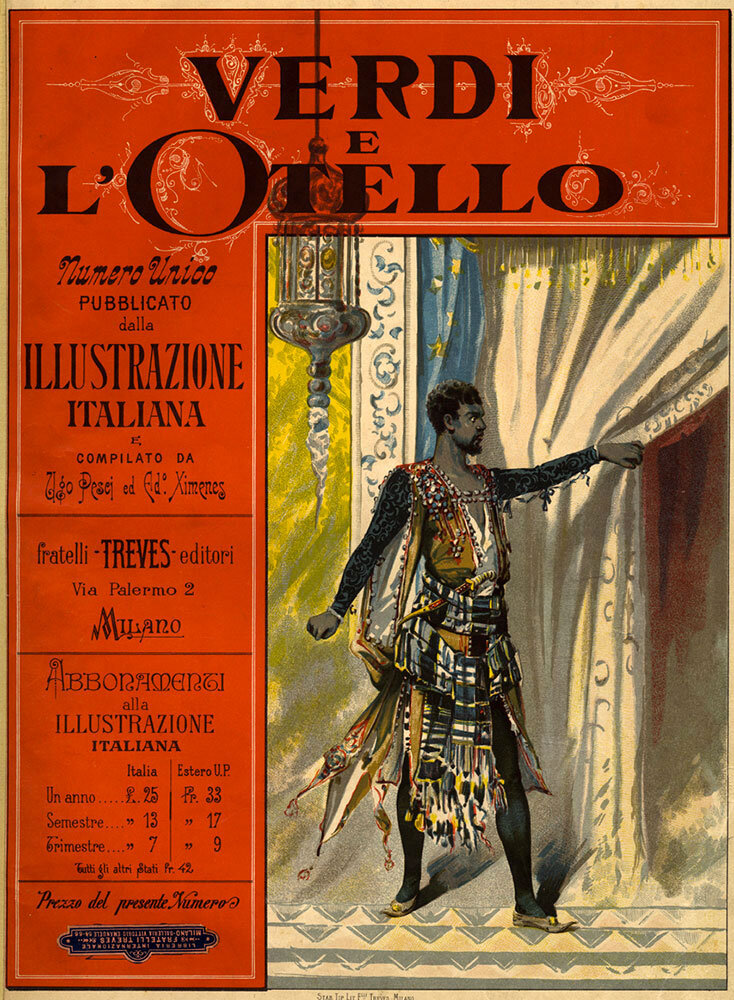The Music of Otello
Some Few Observations on the Music of Otello
Verdi’s Otello may very well be the greatest of all Italian Romantic operas. From the pedigree of its source material to the unrivaled quality of its libretto, Otello breathes out importance and artistic accomplishment at every turn. But it is Verdi’s music, of course, that gives eternal immediacy to Shakespeare’s timeless tragedy and searing poignancy to Boito’s fluent script.
The degree to which the music of Otello is symbiotic with its drama cannot be exaggerated. The orchestra is the storm that rips open the curtain with titanic fury to begin the opera. Nowhere in musical art is nature depicted with more elemental aggression. Verdi’s relentless cauldron of sound makes the humans who fight against it seem the weak mortals they are, right up until the moment Otello strides ashore victorious. Sculpted in the indomitable key of C-sharp Major, his opening “Esultate!” is a phrase of stentorian heroism and nobility. It defines who he is and gives luster to the glorious heights from which he so precipitously plummets.
There is always a sense of inevitability to Verdi’s musical thrust. It’s evident in the way in which Iago’s first-act drinking song spirals headlong into the boisterous brawl that rouses Otello’s righteous indignation. Just as Gounod twenty years earlier used a cello quartet to symbolize the depth of Roméo and Juliette’s ardor, so Verdi uses the same instrumentation to draw us into the ineffable beauty of Desdemona and Otello’s love.
The second act begins with a “germ motive” of Beethovenian compactness—a four-note turn of a phrase that represents the abject evil of Iago. While it finds its apotheosis in his blasphemous Credo, this little phrase continues to metastasize throughout the body of the drama and proves to be malignant as Otello begins to descend into the anguish brought on by his mistaken jealousy. The astonishing speed with which Otello is driven to his erroneous assumption is rendered plausible to the audience only by virtue of the persuasiveness of the music.
The third-act finale is an achievement no less impressive than the great comparable scenes in Aida and Don Carlo. Here Verdi manages to capture the brilliant radiance of Mediterranean courtly pageantry as well as the devastating weight of the public/private grief and bewilderment that have so disabled Otello and Desdemona. The expansive writing for orchestra, chorus and soloists is marked by a disarming transparency that belies the density of its forces. It all amounts to one great and tragic Lacrimosa.
The atmospheric music that opens the final act evokes a lonely melancholy similar to Der Abschied of Mahler’s Das Lied von der Erde. After the simple nostalgia and foreboding of Desdemona’s “Willow Song,” her Ave Maria leads us into a translucent realm of spiritual and emotional poignancy unmatched in all of opera. The composer’s string writing in this moment is unsullied perfection, continuing without a break to the entrance of Otello. Here the solo string basses play a passage that grows from utterly pallid bleakness to barely containable violence.
The rest of the opera plays out like a nightmare, with the near-cacophonous ferocity of the murder to the empty bars of unaccompanied recitative when Emilia confronts Otello with the truth. In the end, Otello can’t bear the truth. For the audience, too, the emotional weight is heightened as Otello takes fleeting note of the glory and love that now lie wasted. The “kiss motive,” so rapturously beautiful in the first act duet, returns with devastating tragedy, swelling and retracting as Otello expires at Desdemona’s side.
-Steven White
